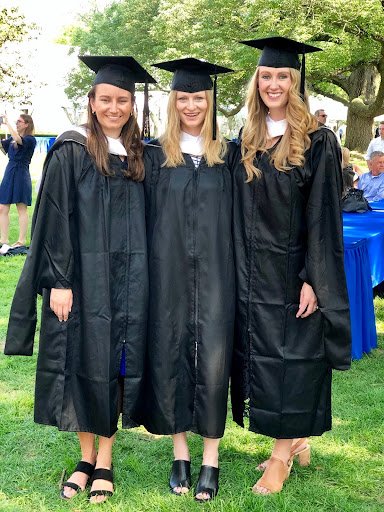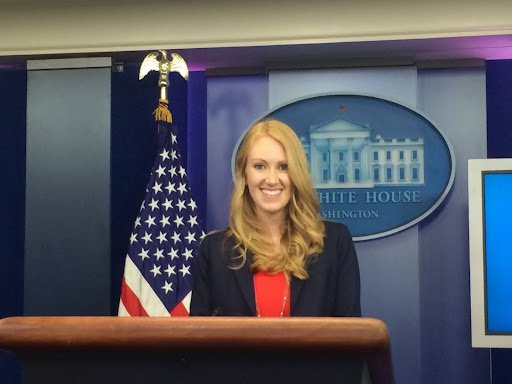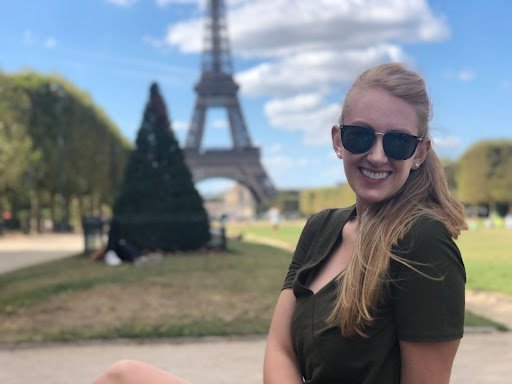Trust & Safety Operations Manager, San Francisco , CA
Describe your career. What do you do for a living?
I currently work at Pinterest on the Trust & Safety Operations team. I manage a team of 8 incredible folks internationally. Together we work hard to keep Pinterest safe. We’re mostly focused on the detection, review, and enforcement of content that might violate our Community Guidelines.
As a kid, what did you want to be when you grew up?
The earliest memory I have of answering this question was me declaring I wanted to be a crossing guard. I think our neighborhood crossing guard, Sunaan, who safely shepherded me across a busy intersection so I could get to and from my elementary school every day, influenced this answer. In some ways, though, I think what I do today connects to this. There is a thread throughout my earliest jobs and every career choice since that focuses on helping others. I have always been motivated to join mission-driven companies that keep safety and integrity central, and to take roles that allow me to create a positive impact for others.
What did you study? How much schooling do you think is required to get into your role? What could you have skipped?
I was lucky enough to study Psychology and Legal Studies at UC Berkeley, and I earned my Master’s in International Security Studies with a focus on Counterterrorism at Georgetown University’s Edmund A. Walsh School of Foreign Service. I say lucky because while I did work hard, I recognize the tremendous amount of privilege and support I had along the way that helped set me up with those opportunities, and that’s really important to acknowledge.
Graduation day!
Georgetown Commencement’s speaker,
The Honorable Dr. Madeleine Albright, former Secretary of State, and beloved SFS professor
I don’t think any specific schooling is required to enter my field. I’ve found that some of the most effective colleagues I’ve had the joy of working with bring really practical skills to the job, and really diverse perspectives from unexpected experiences. And both make them more effective and successful than folks that have advanced degrees or a more “traditional” (by Western societal standards) background on paper. They’ve honed critical thinking, valuing differences, task and time management, prioritization, and interpersonal communication skills through a variety of roles and experiences like being a waiter, a teacher, a graphic designer, a musician, serving in the military, and through immersion work and study programs (think Teach for America, Peace Corps, and more). Their crucial skills and diverse perspectives apply in my field and countless others, and often can’t be taught in a classroom.
Was your path hard or smooth getting to where you are in your career? (Can you briefly describe what it was like on your journey so far?)
Once again, I’m quick to recognize my privilege. My career path has been more smooth than most. For example, I had familial support to pursue unpaid and low-paid internships to help build career experience. One of my early career roles in Washington, D.C. was a result of taking a particular professor’s class and eventually joining his startup, which was only made possible by having access to an environment like Georgetown. I also had a close friend who referred me for my current role at Pinterest today. I work hard, but acknowledge the help I’ve had along the way. It motivates me to extend a hand to others whenever I can so they might have greater opportunities, too.
I’d also note that a “smooth” journey doesn’t mean I haven’t changed my mind along the way. I’ve pivoted at times! I was an antitrust paralegal convinced I would go to law school. After earning my Masters in something else, I was convinced my career would be dedicated to being a civil servant in the USG intelligence community. But things have a way of changing, and I’ve enjoyed it.
Kenna inside the White House
Briefing Room
And at the White House
Bowling Alley, of course
Walk us through your typical work day—when do you start, end, and do all day? (Where do you work from?)
I typically work from home because Pinterest is a remote-first company. We’re lucky to have access to Pinterest offices, as well. I frequent two different offices, especially when I want to collaborate with others or need an uninterrupted, head’s down day of work. While no day looks the same given the dynamic nature of my work (we deal with a lot of escalations!), a lot of my day is spent in meetings that start relatively early since I coordinate with teammates in Europe.
What are some questions someone should really ask themselves if they want to get into your industry / career path?
I think the biggest question folks should consider is why do they want to get into this field? Trust and Safety feels incredibly unique because it’s truly a field made up of dedicated, thoughtful professionals grappling with some of the most complex and practical policy and research questions of our time. Our decisions and work have direct impacts on society and individuals’ lives. I think it’s a responsibility no one should take on lightly; you have to understand the stakes, and be motivated by the bigger picture. Otherwise the downsides of our work - like escalations, constant exposure to graphic and challenging content, and experiencing the worst of human behavior online - can take over.
What do you enjoy most about your career? (What do you enjoy least?)
I enjoy working with some really amazing humans to solve really challenging, interesting, and evolving problems that have real impact. All those headlines about GenAi creating non-consensual images of Taylor Swift? And how we protect our democracy by maintaining election integrity? Those are questions we grapple with every day. I could have never guessed I’d land in this field (in part because for a while I didn’t know it even existed or had an official name, even though I was doing comparable work in D.C.!) but I’m so glad I did. I feel like I’m exactly where I’m meant to be.
Kenna and her team at Pinterest
What tools/resources do you frequently use? (Books, podcasts, mentors, wellness habits, software, etc.)
I don’t love to be too prescriptive; what works for me may not work for someone else. But - I do love to read. Books, and more recently, audio books, are incredible resources for me. And that’s equally true of “self-help” or growth and development books as it is for indulgent, fiction books. I believe both offer me things that make me better at what I do, and enrich my life generally. I do have my own “wellness” habits, like journaling, exercising, meditating, exploring creative hobbies, volunteering, and playing with my dog, but here, too, I think the history of “wellness” industry is complicated and folks should just be curious about what works best for them, rather than honing in on what they feel like wellness “should” look like.
But, if you’re looking for more resources about Trust and Safety specifically, check out this blog post describing some of my colleagues’ great work : https://www.pinterestcareers.com/en/life-at-pinterest-blog/pinterest-life/people-behind-the-product-safer-internet-day/?utm_source=Organic_LinkedIn&utm_campaign=sid-Q12024_&utm_medium=blogarticle. I also always recommend The Trust and Safety Professionals Association, and their countless resources : https://www.tspa.org.
What is something you do when things get difficult? How do you handle stress/ challenges?
I typically rely on the tools and habits I outlined above whenever things get difficult or when I’m facing extremely challenging times. Those - and a cup of coffee, a good book, a walk, or a quick trip to the beach or getting out in nature with my pup tend to do the trick.
I know it’s not a realistic option for everyone, nor is it a fit for everyone, but I’m also lucky to have a therapist that I really respect and value. Going to therapy alone helps me get through difficult times, but it’s also a space that reminds me to return to those tools and habits that work for me. We often talk about going “back to basics” when things get tough - think drinking water, eating nourishing food, prioritizing moving your body in a way that feels good, prioritizing sleep.
My therapist was also the one that encouraged me to take medical leave from work last fall after being diagnosed with cancer. Unfortunately, for too long I think a lot of my identity and self-worth were tied up in my career. My experience with thyroid cancer and medical leave was an important forcing function to reexamine my values and priorities, and I’m extremely grateful for that. I also wouldn’t want anyone to have to get to that point - so let this be a reminder that nothing should keep you up at night about work! It’s just not that important! And it will always be there, in some way, shape, or form.
What advice would you give to someone who is trying to figure out what they want to do (for work) in general?
I’ve received all sorts of advice throughout the years, and different tidbits resonate differently depending on where you are in the moment and what you’re facing. Also, I’m still so early in my career, and I consider myself a “forever student” - there’s always more to learn! But I’ll share a few key pieces of advice that resonated with me recently in case they resonate with someone else too:
Remember that you’re not building a career, you’re building a life. Figuring out what you want to do “for work” directly impacts the design of your life. Prioritize answering questions like - what kind of life do you want to lead, what are your values, what experiences do you want to prioritize, and why - and find work that fits into that picture.
Don’t be too good at a job you don’t want. I think today we’re all subject to comparing ourselves to others, or what we think we “should” be doing, achieving, earning, etc. Just because you might be good at something doesn’t mean you should do it. I think focusing on what’s right for you, knowing when to say no, and learning how to set boundaries are critical to figuring out what work you might enjoy doing, and how it best fits into your life.
It can be helpful to reframe your journey as a “jungle-gym.” There’s no straight line or direct path. You don’t always have to move “upward.” There are times when it might make sense to take a step back, totally pivot, move sideways, or take the “good enough” job. All of those are valid choices that will lead to their own successful outcomes, and likely a much more interesting and enjoyable journey than only focusing on an upward climb or the next promotion. Plus, jungle gyms are fun, and your journey should be too!
Do you have any mentors or key pieces of career advice that helped you get to where you are today?
I’ve had some incredible professional mentors, but I’d be remiss if I didn’t mention my parents as mentors. My mom had a rather unconventional, and very successful career. Watching her balance that while raising my older sister and me left an indelible mark on me, my values, and my world view around work and family. And of course, her partnership with my dad enabled that dynamic. I also think the longer I work, the more I understand about myself and professional environments. With that understanding I’ve come to see that I channel a lot of my dad’s best skills and characteristics (in day-to-day life, but especially on the job!).
Kenna on a graduate school research trip in Paris
What excites you about the future OR what's up next for you in the near future? (Could be career-related, life-related, or even a future career pivot / path)
Honestly, there is a lot that excites me about the future! I try to stay optimistic and open-minded about what might come, whether it’s career- or life-related. I think work will remain incredibly interesting as we face another historic U.S. Presidential election this year, and as we continue to watch the rise of GenAI and LLMs. But some of the most memorable experiences of my life to date were completely unpredicted, so I’m buckling up and along for the ride!








